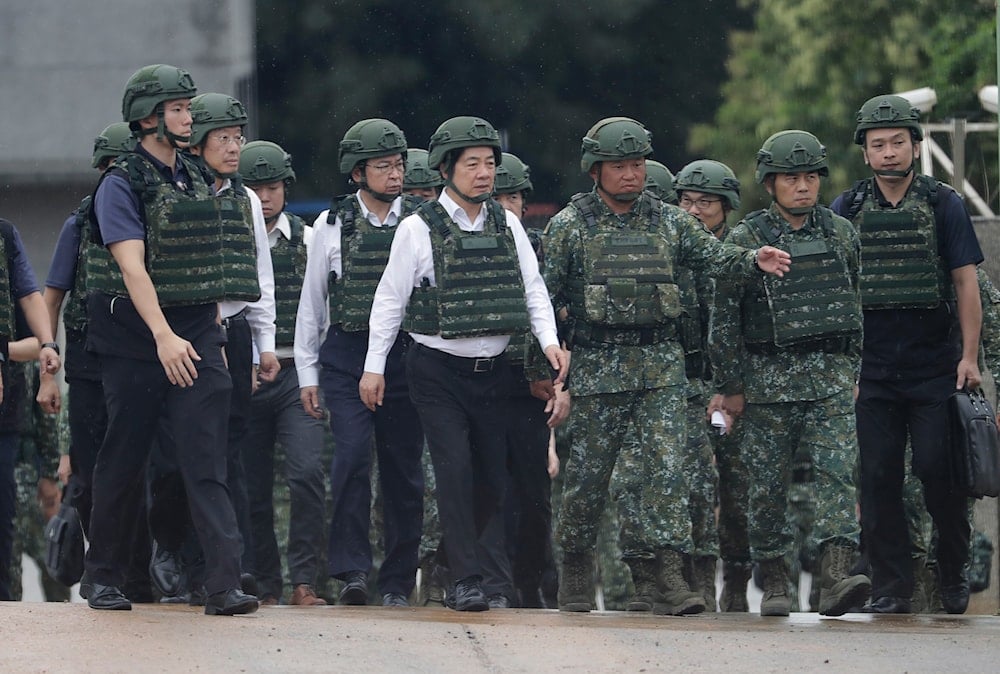US demands allies' plans in event of Taiwan war erupting
The Pentagon urges Japan and Australia to clarify their role in a potential US-China war over Taiwan amid rising regional tensions.
-

Taiwan President Lai Ching-te, center, inspects a live-fire shooting training in Hsinchu County, Taiwan, on Thursday, July 10, 2025 (AP)
The Pentagon has been urging Japan and Australia to specify how they would respond in the event of a US-China war over Taiwan, a move that has caused growing frustration among Washington’s two key allies in the Indo-Pacific region, the Financial Times reported on Saturday.
Elbridge Colby, serving as undersecretary of defense for policy, has, in recent months, raised the issue during meetings with Japanese and Australian defense officials, according to five sources familiar with the matter. This comes as part of his broader effort to persuade Indo-Pacific allies to strengthen deterrence and prepare for a possible war over Taiwan.
A US defense official declined to comment on the Taiwan-related request but emphasized that the central focus of Colby’s talks with allies was to step up and speed up efforts to reinforce deterrence in a manner that is both "balanced" and "fair". The official emphasized that the Pentagon’s efforts were aimed at avoiding war by building a strong deterrent shield.
“That requires strength — but it is a simple fact that our allies must also do their part,” the defense official told FT, adding, “We do not seek war. Nor do we seek to dominate China itself. What we are doing is ensuring the United States and its allies have the military strength to underwrite diplomacy and guarantee peace.”
Defense spending once again on the agenda
The discussions have included attempts to convince allies to increase defense spending as worries grow over China’s alleged threat to Taiwan, while the push for explicit commitments tied to a potential war over the island marks a new element in Washington’s demands.
“Concrete operational planning and exercises that have direct application to a Taiwan contingency are moving forward with Japan and Australia,” one person told Financial Times, noting that "this request caught Tokyo and Canberra by surprise because the US itself does not give a blank cheque guarantee to Taiwan.”
Zack Cooper, an Asia expert at the American Enterprise Institute, told the Financial Times that securing clear commitments from allies regarding their role in a war over Taiwan is challenging, since they lack clarity about both the circumstances of such a scenario and how the US itself would respond.
“President Trump has not committed to defend Taiwan, so it is unrealistic for the US to insist on clear commitments from others," he emphasized.
A question that raised eyebrows
The effort has targeted defense officials in Japan and Australia rather than senior political leadership, and according to a second FT source, the push prompted a “collective raising of eyebrows” among representatives from Japan, Australia, and other US allies.
Japan’s Defense Ministry stated that it was “difficult to answer the hypothetical question of a Taiwan emergency,” adding that any response would “be implemented on an individual and specific basis in accordance with the constitution, international law, and domestic laws and regulations." The Australian embassy did not comment.
The discussion around Taiwan planning is unfolding as Tokyo and Canberra face growing pressure from Trump to increase defense spending, a development that Colby’s allies view as especially critical in light of what they perceive as an escalating threat posed by China in the Indo-Pacific region.
The official expressed confidence that Japan and Australia would accelerate their defense spending at a faster pace than their counterparts in Europe.
The official mentioned that the Pentagon had obtained "positive" signals regarding increased spending from Japan and Australia but emphasized that achieving concrete outcomes remained essential for all parties involved.

 4 Min Read
4 Min Read








